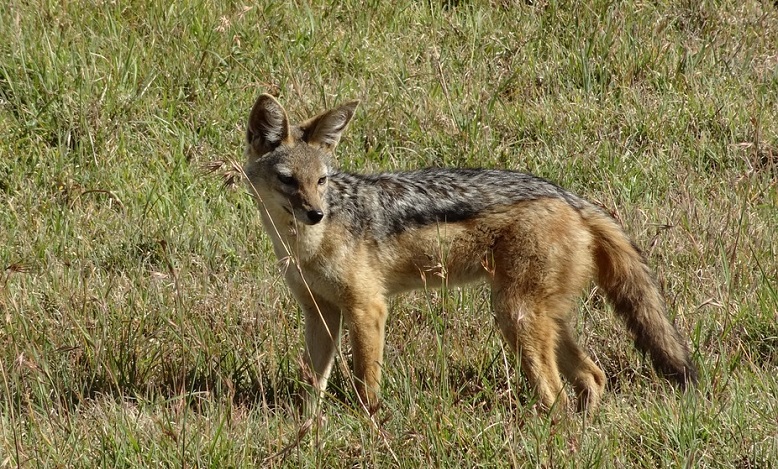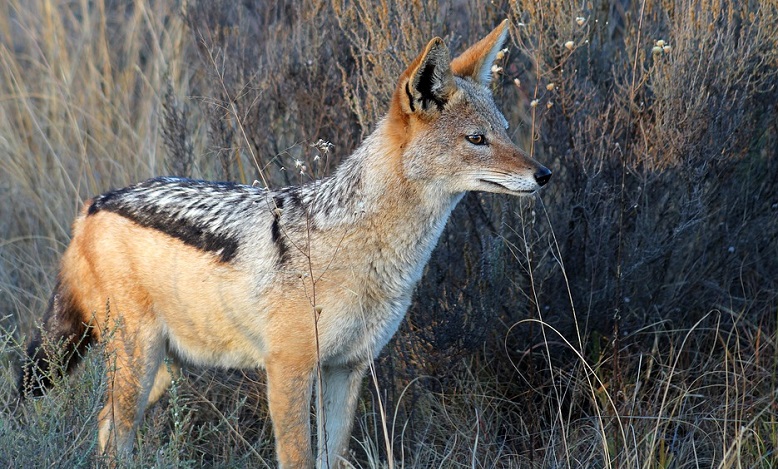Lions are stronger, leopards are bigger than them – if you see their competitors, and you can almost get pity on the jackals.
But the little wild dogs know a lot of tricks to survive in the savannah of Africa. They strike at lightning speed, if nobody anticipates it, and just plaster everything. And if it has to, the clever guys do not give up fighting.
No wonder that the jackal enjoys the reputation of a clever animal among the people of Africa, as in our fables the fox.
In the realm of lions, leopards and hyenas, the small wild dogs survive with cunning and speed. Jackals can hunt in the team or alone.
Jackal – Spirit Animal
The dog is the domesticated wolf. In all Humanity, in the prehistoric era of any place in the world, man domesticated the wolf, fed him, and gave him shelter in his cave, and they became inseparable friends, and so the dog is the best friend of man since the Neolithic, and in any part of the earth.
It is the animal that has lived with man the longest, they have helped each other and it is thanks to the loyalty of the dog that man has been able to achieve goals that would be almost impossible to achieve on their own. These noble animals used to give warning signs of imminent danger. They helped in the hunt and were a great source of heat in the long winter nights.
If a person is a carrier of the dog’s medicine, he usually serves others or humanity in some way. Here is the charity worker, the philanthropist, the nurse, the counselor, the minister, and the soldier.
In Chinese symbolism, the legendary dog Fu is a guardian of the sacred spaces and also embodies the concepts of protection. Dogs are considered symbols of good luck, wisdom, loyalty, obedience and Prosperity.
Jackal – Totem
Native American Indian tribes have long depended on the dog for their helpful guidance and help in daily tasks.
In fact, when the horses were introduced to North America by the Spaniards, they called the horses “dogs of the sky” and trained them for tasks in helping the tribe, just as they did with the dogs. The Native Americans saw in the dog the wisdom, the help, assistance, protection and fidelity, to the community, friendship and communication.
However, it must also be said that in several native tribes of Central and South America, although they recognized the merits of dogs, they ate them, but for them it was natural and a sign of respect for nature, they saw no harm in their behavior.
In fact for them it was an important totem and they incorporated it into their zodiac, both the Mayas and the Aztecs.
Native African and American cultures saw him as lord of fire and rain.
However, the Muslims considered it dirty, and use “dog” as a pejorative term for the infidels. The Avesta, sacred book of the ancient religion of Persia (Zoroaster), speaks of a rainbow bridge guarded by a yellow dog, which expels the demon from the souls of the good.

Vulcan, the Roman god of fire and metal, forged a bronze dog that little by little came back to life under its divine breath. From this dog was born Cerberus, the watchdog of Hades. Cerberus, is chained to the gates of Hades, where he makes cajoling to those who enter and eats those who try to escape.
It has three heads: one lion, one wolf and the third dog, with a mane of twisting snakes, dragon tail and the body of a mastiff. The ancient Romans placed a cake in the hands of their dead to pacify Cerberus.
The dogs were also consecrated to Hecate, the Greek-Roman archaic goddess of sorcery, the arcane and darkness among other things, but undoubtedly, an expert in the spiritual journeys that Hecate fiercely made with her dogs that barked with equal vigor. Humans saw death, darkness, moonstruck, traveling at midnight…
However, what Hecate defends is the right of the soul to wander in these little known alleys of the extrasensory world. With his pack of dogs guiding the way (and the protection of both the body and the spirit), astral travel becomes much easier.
Hecate and her dogs also speak and protect those who could not do it themselves. The newborns. Hecate and her dogs represented an “Alliance for the Defense and Protection” of those who cannot defend themselves (babies, children, the defenseless, the marginal, the insane and the unjustly slandered).
Jackal – Symbolism
According to Jean Chevalier and Alain Gheerbrant’s Dictionary of Symbols (1969, revised and revised edition, 1982), “because it screams to death, roams around the cemeteries and feeds on corpses, the jackal is a bad animal. Auspicious, like the wolf, in Hindu iconography it serves as a mount for Devi in its sinister aspect.
Some texts of the same origin make it a symbol of desire, of greed, of cruelty, of sensuality, in fact feelings and sensations exacerbated.
The jackal was considered as the symbol of the Egyptian god, Anubis, who was supposed to incarnate in a wild dog and is usually represented with a jackal’s head. In reality, the real jackal did not exist in Egypt; it is a question of stray dogs, beasts with false airs of wolves, with large big ears and slender snouts, slender limbs, long, bushy tail.
They were known for their aggressive velocity and roamed the mountains and cemeteries. Anubis, god for the care of the dead, watching over the funeral rites and the journey to the other world; he was called the lord of the necropolis.
His most famous sanctuary was at Cyonopolis, the city of dogs. This dog-jackal-psych pomp symbolizes the death and wanderings of the deceased, as long as he has not reached the valley of immortality. It would not be exact despite superficial analogies, to confuse it with the Cerberus of the Greek Hells. ”
According to Nicki Scully, author of Meditations of the Power Animal, Shamanic Travels with Spirit Allies (original editions 1991, 2001), “native to Asia and Africa, the Jackals are predators renowned for their skill and cunning, when they roam the edge of the desert.
They are like coyotes and share some of their attributes. Their time is darkest, just before dawn, when you can hear them screaming to greet the new day.
Jackal – Meaning
Anubis, the jackal god of Egypt, has a unique, illuminated perspective. He is guardian of the Inframonde, the Opener of the Way. In Egyptian theology, Anubis is the one who examines the balance to death. When someone dies, he or she is brought in front of Thoth’s scale, and his heart is weighed, a feather of Maät, the goddess who represents truth and justice, counterbalancing.
With Anubis, you can explore the Underworld. He has subtle hearing, extreme clarity, a very advanced sense of smell, and the ability to differentiate the various sources of light and darkness. He sees all the colors, the darkness and the light, he moves with the speed of thought. Without taking the time to think, he acts instinctively.
Anubis is a master, and through his eyes you receive education, knowledge, and protection. He guides people, leading them through darkness, and returning to the light. Many people fear darkness, and knowing that there is a guide to help you, can bring you a lot of comfort.
In the next trip, you will have the opportunity to explore heavy situations or traumatic incidents in your life, which you may have repressed or forgotten.
In the presence of Anubis, you can highlight the energy glued, and release – energy that has accumulated around these events and old situations.
Take a little time before making this trip, to think about the problems in your life that you are ready to take care of. It is also possible, in the presence of Anubis, to awaken memories of events which can be buried under your conscious memory. Relax, and give yourself permission to explore as deeply as you wish.
To meet Anubis through the Cauldron process, you will find Thoth in the darkness of the night. He directs you to the bright eyes of the jackal hiding in the shadows. Once initiated, you can summon Anubis as guardian and protector.

